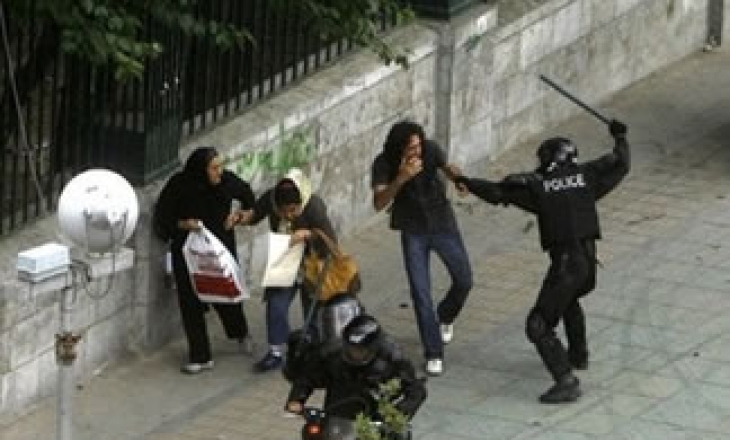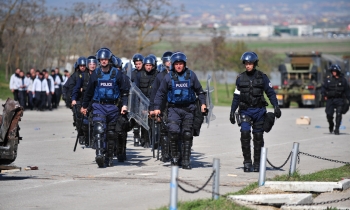Iranian authorities have criticised international media reports and taken steps to control the flow of information from independent news sources as anti-government protests raged in the country for the third day on Monday. Opposition candidates Mirhossein Mousavi and Mehdi Karoubi have appealed to their supporters not to accept the “rigged results.”
The British Broadcasting Co said that electronic jamming of its news report, which it said began on election day Friday, had worsened by Sunday, causing service disruptions for BBC viewers and listeners in Iran, the Middle East and Europe, the Associated Press (AP) said in a report. BBC said it had traced the jamming of the satellite signal broadcasting its Farsi-language service to a spot inside Iran.
More from the AP report: [Link]
President Mahmoud Ahmadinejad lashed out at the media shortly after he claimed victory in the election that critics contend was marked by widespread voter fraud. At a news conference Sunday, he accused international media of launching a "psychological war" against the country. Street protests broke out in Tehran and were fiercely battled by anti-riot police.
A range of communications have been disrupted inside Iran since election day, including those which could be used to organize protests.
Iran restored cell phone service Sunday that had been down in the capital since Saturday. But Iranians still could not send text messages from their mobile phones, and the government increased its Internet filtering in an apparent attempt to undercut opposition voices. Social networking sites including Facebook and Twitter were also not working.
Iran's government has not commented on the restrictions but has accused international media of exaggerating the extent of the street protests in Tehran and of trying to destabilize the government.
On Saturday, Iranian officials contacted television journalists for The Associated Press in Iran and warned that the government would enforce an existing law banning provision of news video to the Farsi-language services of the BBC and the Voice of America. Both agencies broadcast to Iranians via satellite in their own language. AP employees then contacted the BBC and VOA to discuss the order.
"It is the AP practice to comply with local laws regarding media. We are nonetheless determined to continue to provide accurate coverage of events in Iran," said AP's Executive Editor Kathleen Carroll.
There were a variety of other clamp-down steps affecting both international and domestic news organizations. For instance, officials telephoned several visiting international journalists with visas to cover the elections and told them that their visas would not be extended after the vote, a courtesy often offered in the past. Two other international news agencies that operate in Iran, Reuters and Agence France-Press, declined comment. Neither reported any restrictions on their journalists.
A spokesman for the Swedish network SVT, Geronimo Akerlund, said its reporter, Lena Pettersson, had been asked to "leave Iran as soon as possible because the elections are over."
Dubai-based news network Al Arabiya said the station's correspondent in Tehran was given a verbal order from Iranian authorities that its office would be closed for one week, said Executive News Editor Nabil Khatib. No reason was given, but the station was warned several times Saturday that it needed to be careful in reporting "chaos" accurately, he said.
German television network ZDF said Sunday on air that its reporter in Iran and other reporters were being "prevented from doing their jobs in a massive form." The network said it was unable to show a broadcast feed from the network's correspondent depicting protests.
Italian state TV RAI said one of its crews was caught in a street clash. An Iranian interpreter was beaten with clubs by riot police and officers confiscated the cameraman's videotapes, the station said.
Within Iran, state-run newspapers carried no news Sunday about the widespread street clashes the day before. But on Sunday, state TV showed some video footage from the two days of protests.
A newspaper started by the main reformist candidate, Mir Hossein Mousavi, did not appear on newsstands Sunday. An editor, who spoke on condition of anonymity because of the sensitivity of the situation, said the paper, called Kalemeh Sabz or the Green Word, never left the printing house because authorities were upset with Mousavi's statements after the elections.
The paper's Web site reported that more than 10 million votes in Friday's election were missing national identification numbers, data which make the votes "untraceable." It did not say how it knew that information.
At his news conference, Ahmadinejad made light of restrictions on the press and media.
"Don't worry about freedom in Iran," he said. "Newspapers come and go and reappear. Don't worry about it."
“Amid mounting allegations of massive fraud, the government is implementing propaganda and censorship measures to legitimise Mahmoud Ahmadinejad’s claim to a first-round victory,” Reporters sans Frontières (RSF) said. “It is vital that Iranian and foreign journalists present in Iran should be free to investigate the reports of fraud throughout the country. The presidential election’s credibility depends on this.”
The authorities have blocked access to pro-reform websites and sites that support Mousavi and Karoubi. Those blocked include Entekhab News (http://www.entekhab.ir/), which has been inaccessible since 11 June. The Ayandenews website (http://www.ayandenews.com/) was closed yesterday on the orders of the Tehran prosecutor general and police searched its offices. The authorities also closed the Moj Sevom (Third Wave) website (http://www.mowj.ir), which was showing a live TV feed from the Mousavi campaign headquarters.
Norooznews (http://norooznews.ir), a news website operated by the pro-reform Islamic Participation Party, which is backing Mousavi, and Ghalamsima (http://www.ghalamsima.com/), which is supporting the Mousavi campaign, have also been blocked.
The state-owned media lost no time in announcing that President Ahmadinejad had won his reelection bid. “By obtaining the majority of votes in this 10th presidential election, Dr. Ahmadinejad has been victorious,” the government news agency IRNA reported.
Tehran prosecutor general Said Mortazavi ordered pro-opposition newspapers on the evening of 11 June forbidding them to lead with stories announcing their candidate’s victory. Kalameh Sabaz, a newspaper owned by Mousavi, was threatened with having its printing press confiscated and had to change its front-page story proclaiming that Mousavi had won.
According to the partial results released by the Electoral Commission, which is controlled by Ahmadinejad supporters, Ahmadinejad has won about 65 per cent of the votes. This is disputed by his rivals, especially Mousavi, who is also claiming victory. The official websites of some of the candidates, including Karoubi’s (http://teribon.com/), were also blocked today after they criticised the Electoral Commission’s results.
Finally, some of the foreign journalists who are in Iran to cover the elections have been notified by the authorities that their press visas will not be renewed.










